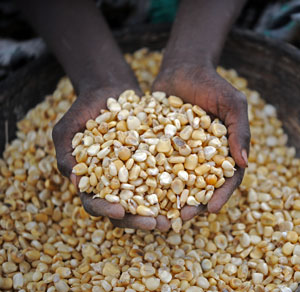Australia Africa Community Engagement Scheme (AACES) Annual Report 2011-12
Links on this page are to external websites.
Overview
AACES includes activities to better inform the Australian public about development issues and challenges in Africa, and the way in which Australian aid is seeking to respond to these challenges. In the first year of AACES, this objective was addressed by NGOs through activities to raise awareness, inform and educate the Australian public about issues of poverty and development in Africa. For the most part, NGOs worked in partnership to explore and take advantage of opportunities to engage the Australian public. Opportunities for partnership and collaboration were facilitated by the creation in March 2012 of the AACES ANGO Communicators' Forum which has representatives from the ten Australian AACES NGOs.
Activities undertaken during the year
Go Bare Initiative
CARE and Marie Stopes International worked together to develop the Go Bare initiative. Through online channels, print advertising and media coverage, Australians were encouraged to go without something for one day to raise awareness about women and girls in Africa who go without basics every day of their lives. The NGOs provided information on AACES programs and the impact they are making on the daily lives of women and girls.
Speaking tour for Anglican Overseas Aid
Anglican Overseas Aid conducted a successful speaking tour to Australia. The tour, which was carried out by representatives of the Afar Pastoralists Development Association and Mothers Union of the Anglican Church in Kenya, brought alive the plight of nomadic pastoralists in the Maasai and Afar regions in Kenya and Ethiopia.
It also highlighted the work being done to provide safer birthing practices and improved child and maternal health services in these regions. During the tour, they held interviews on radio and television and a blog was established on their website.
Global Poverty: Teacher's Toolkit
The Global Poverty: Teacher's Toolkit is a resource developed by CARE for Australian teachers to help them teach their students about poverty. The 2012 toolkit features the AACES supported WE-RISE program and a video by CARE. It is available in hard copy and online to the teaching fraternity across Australia.
Curriculum development
Using experiences from AACES, Caritas is working with educational institutions in Western Australia to increase their knowledge and awareness of the development challenges facing Africa. Six participants from these institutions took part in a 20-hour formation course which looked at aid and development with a specific focus on Malawi and Tanzania. This knowledge will be used in the development of curriculum units in these institutions and has a vast multiplier potential to reach tens of thousands of students.
Website and social media
Nomadic pastoralists face a limited life span, up to 20 years below the average for the Horn of Africa, in part due to a limited diet. The AOA project in both Kenya and Ethiopia are supporting those pastoralists who have adopted a semi-sedentary existence, with the provision of seeds and technical advice to grow their own crops. This approach improves their health, including mothers and children, by broadening the diet. Photo: Josh Estey/CARE
Numerous AACES partners have used websites, social media and blogging to engage Australian and international audiences.
WE-RISE is featured on the CARE website providing information on the program's activities in Ethiopia, Tanzania and Malawi. WE-RISE was also featured on CARE's blog, highlighting the program's priority areas of women empowerment and food security.
Anglican Overseas Aid has established a blog site for their project, documenting stories from the field and providing interesting analyses on maternal and child health for nomadic communities in Ethiopia and Kenya.
During the year, ActionAid called upon female writers who have a connection with the land through the Hunger Busting Blogger competition. This competition identified two pioneering ambassadors who provide contrasting but important perspectives on food security. These two female farmers draft monthly blogs that raise awareness about agriculture and food security issues in Africa, drawing links and synergies between their own realities and that of smallholder farmers in Uganda. Their blog posts attracted 2,500 visitors in the first year.

